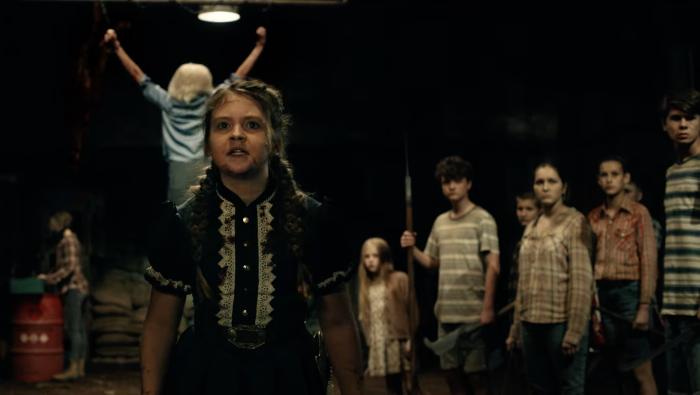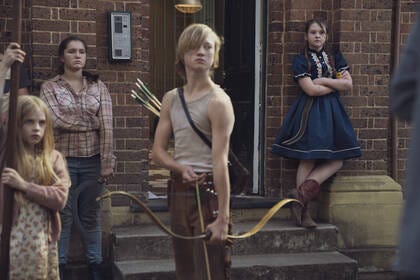Kurt Wimmer's 2020 Take on Children of the Corn is that Rarest of Pop-Culture Anomalies: an Unnecessary Reboot!
I never thought I'd write these words, but I'm not sure this movie needed to be made.
Stephen King is famously prolific. He’s a writing machine that is constantly churning out short stories, novellas, and novels for an adoring and insatiable public. He’s less prolific as a screenwriter, though, wouldn’t necessarily be the case if every screenplay King adapted from his own work made it onto the big screen.
King may be the single most commercially successful American author, but he’s much less of a draw as a screenwriter.
King’s name on a paperback cover might promise robust sales, but his name in the opening credits of a horror movie is no promise of boffo box-office. Some of the most iconic and successful adaptations of King’s works chucked the frightmaster’s screenplay in the circular file. Stanley Kubrick reportedly didn’t even read King’s script for The Shining and that movie did pretty good. It has a bit of a cult.
The Carrie author wrote a screenplay for 1984’s Children of the Corn, an adaptation of a short story that first appeared in Penthouse in 1977, but the producers rejected it as excessively talky and insufficiently cinematic.
It takes chutzpah for low-budget filmmakers to reject the work of one of the best-selling authors of all time, but the decision proved a wise one, in part because the first act of King’s screenplay apparently consisted of its married protagonists squabbling.
There’s not really enough in King’s short story to sustain a 90-minute motion picture. That somehow did not keep the 1984 original from becoming a sleeper hit and spawning eight sequels, one of which featured Naomi Watts in her first-billed role, as well as a 2009 remake and a 2020 reboot from Kurt Wimmer that fucked needlessly with the franchise’s core mythology in ways that must have seemed audacious on the page but is deadly on the screen.
For starters, Wimmer removed the essential outsider element by making his protagonist Boleyn Williams (Elena Kampouris), a fresh-scrubbed seventeen-year-old resident of sleepy Rylstone, Nebraska, who is understandably excited to get the hell away from a rural hamlet that is sleepy and sinister in equal measure.
In the 1984 original, a couple played by Peter Horton and Linda Hamilton stumble onto a secret world where a child with evil intentions has transformed the town’s youth into a murder cult in thrall to a demonic force known as He Who Walks, which is short for He Who Walks Behind the Rows.
The mistakes continue with the choice to replace Isaac Chroner, an angry Amish-styled Fire and Brimstone prophet preaching an unholy gospel with murderous intensity, with Eden Edwards (Kate Moyer), an unpleasant little girl with a grudge.
In a misguided attempt at social commentary and contemporary relevance, Children of the Corn attempts to generate sympathy for Eden by portraying her as a victim of adult duplicity and corruption.
In this modern adaptation of a classic tale, the adults of Rylstone interfere unnecessarily with nature by using GMOs and herbicides to produce a healthy harvest, when everyone knows that the only surefire way to ensure abundant corn crops is through human sacrifice.
To procure government subsidies, desperate farmers destroy the precious cornfields. That enrages both He Who Walks and Eden, his primary prophet.
A better, bolder movie might present Eden’s adult-killing agenda as righteous vengeance gone awry. We’re not encouraged to root for Eden, necessarily, but we’re supposed to feel some compassion for her rooted in the trauma that she has endured.
The 1984 adaptation portrayed the small town where it all unfolds as something ancient and unholy. It’s not a geographic region so much as a circle of hell; folks passing through are lucky to survive.
The Gospel preached by Isaac is an angry one that combines old-time Christianity with Satanism. Isaac may present himself as the picture of piousness, but he serves a satanic force that may be the big red guy himself.
The 2020 adaptation largely discards the spooky, Luddite vibes of the 1984 original for a foolishly modern sensibility, where nothing is more terrifying, on a soul-deep level, than running out of cell phone reception, with the possible exception of your phone’s battery dying.
I don’t envy Edwards. Playing a new version of an iconic character beloved by fright fans for his furious Old Testament intensity is a no-win proposition. Edwards’ performance isn’t just distinctly different from John Franklin’s portrayal of the villain in the 1984 original; it’s antithetical. Edwards’ energy level can only be described as Jeb Bush-like. She seems fueled less by apocalyptic fury than annoyance.
Children of the Corn is a ferociously imperfect adaptation that handles some elements perfectly, like Franklin’s performance and that of Malachai (Courtney Gains), a brutal enforcer who makes no secret of his desire to seize power from Isaac.
Eden’s flunkies are generic and interchangeable by comparison. I appreciate that Wimmer chose to cast actors closer in age to the characters they’re supposed to be playing, but it’s difficult to make a slightly built 12-year-old look scary.
Children of the Corn benefited from practical effects that depicted He Who Walks Behind the Rows as an unstoppable underground force, anticipating the graboids of Tremors in both design and execution.
This wildly unnecessary reboot opts instead to depict He Who Walks as a blurry tree monster through CGI.
I’ll have to rewatch it for this project, but the 1984 Children of the Corn works on a fundamental level. There’s something about it that's deeply satisfying, which helps explain why it has been a part of pop culture for over four decades now.
In the not-so-grand tradition of arbitrary reboots, this makes a loser out of a winner by needlessly changing the franchise’s core elements in a bid to fix what was never broken.










